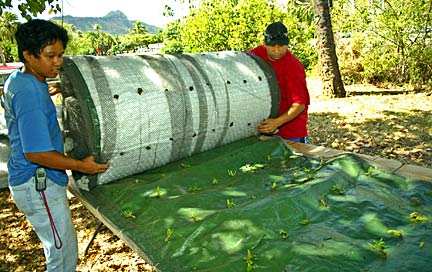
|
Green is clean
for Ala Wai
A company is using floating
platforms of akulikuli plants
to clear up the smelly canal
An unassuming native Hawaiian plant is helping to clean the water in the Ala Wai Canal. Yesterday, a company called Natural Systems Inc. started anchoring floating platforms of akulikuli (Seseveum portulacastrum) in the canal.
How to help
The Ala Wai phytoremediation project is accepting volunteer help from 8 a.m. to noon every Saturday in May. Volunteers should gather at the Ala Wai Golf Course, Diamond Head parking lot. Volunteer work will be on land, planting plants onto platforms, which Natural Systems workers will then anchor in the canal.
Tours AvailableNatural Systems project manager Chad Durkin will also lead free phytoremediation field trips for students or other groups.For more information, contact Durkin at 392-0210.
|
"The Ala Wai is used for canoeing and kayaking and everyone hates how dirty it is and how it stinks," said Eunice Ko, an Iolani School senior who was president of the school's Phytoremediation Club this year.
When Natural Systems completes its yearlong pilot project, "I would hope people would see results and support more projects like this," she said.
The scientific name for the process Natural Systems will employ in the canal is phytoremediation, which roughly translates as "fixing with plants."
The idea comes from nature itself. Before the Ala Wai was built in the 1920s, much of Waikiki was natural wetlands. Streams spread into shallow ponds and marshy areas before emptying into the sea, Durkin said. Plants and bacteria processed the organic material that washed down from the mountains, as well as stopping much of the silt from going into the ocean.
Natural Systems now is trying to condense the natural filtering process of a wetland into 4-and-a-half-foot-wide, 100-foot-long strips of akulikuli growing on floating platforms.
A total of 6,000 linear feet of these patented platforms will be installed along the mauka bank of the Ala Wai this month, between the Kapahulu canoe put-in and the Manoa-Palolo Drainage Canal.
The fleshy-leafed ground cover grows in the wild in Hawaii and is salt-tolerant. Its purple flowers are used to make leis.
Natural Systems has received a $500,000 grant from the U.S. Department of Agriculture's Biosystems Technology Program, which U.S. Sen. Dan Inouye helped establish.

Brian Ildefonzo, left, of Marine Agritech, and Iolani School 10th-grader Kyle Fooks rolled up a raft containing infant akulikuli plants yesterday morning.
In a smaller but similar project at the Hualalai Hotel on the Big Island, a pond on the golf course is kept clean enough that the hotel restaurant raises seafood there. That operation by Natural Systems' predecessor company Strategic Solutions was recently recognized by the U.S. Environmental Protection Agency.
In the four months that Natural Systems has grown akulikuli platforms in tributaries of the canal on the Ala Wai Golf Course, they have increased visibility in that water to 6 feet from about 2 feet, Durkin said.
The plants should reduce the amount of nitrogen, phosphorus and potassium in the canal. And the beneficial microorganisms that live on the plants' roots also help reduce pollution.
Sampling will be done once a month and after heavy rains to measure any changes in water quality, Durkin said.
Marine Agritech Vice President Wen Hao Sun has worked on several phytoremediation projects during his 10 years in Hawaii, including projects at the Honolulu Country Club in Salt Lake, Kawa Stream in Kaneohe and at Hickam Air Force Base.
People have responded enthusiastically to the beginnings of the Ala Wai project, he said. "They see fish in the water where they couldn't see any before and that's exciting," Sun said.
[News] [Business] [Features] [Sports] [Editorial] [Do It Electric!]
[Classified Ads] [Search] [Subscribe] [Info] [Letter to Editor]
[Feedback]
